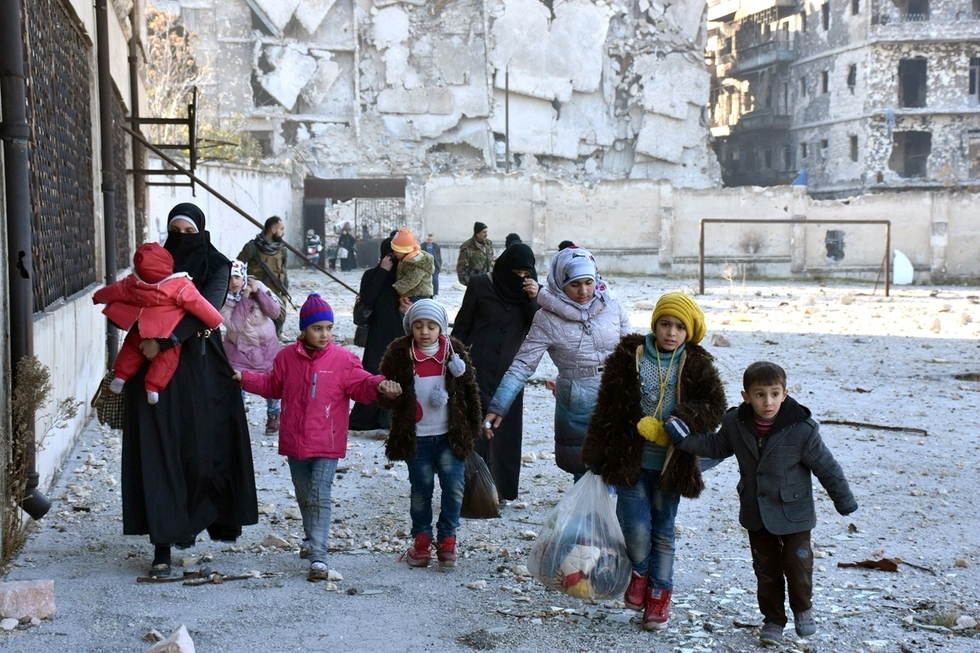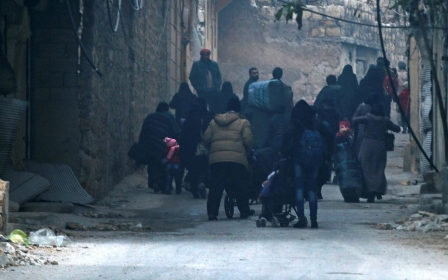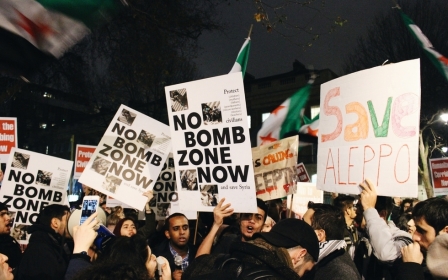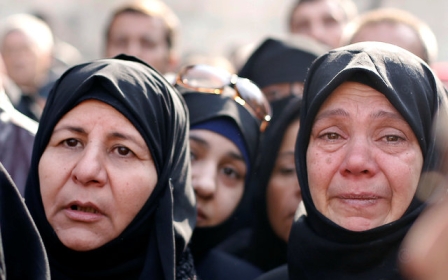Aleppo dies for a cause

The people of Aleppo, like the majority of Syrians, rose against tyranny after they saw fellow Arabs in Tunisia and Egypt topple their own tormentors. Their revolution began peacefully and most Syrians wished for it to remain so. However, the local tyrant, with his regional and international backers, had other ideas. He turned it into a bloody, painful and deadly conflict.
There is already an abundance of evidence to prove that the militarisation of the Syrian revolution was provoked, even planned and executed, by the Syrian regime and its allies, most notably the Shia militias that poured in from Lebanon, Iraq, Iran, Pakistan and even Afghanistan. Most of the Syrians who took up arms only did so after they witnessed savagery being exacted on their loved ones. The crimes perpetrated against innocent and unarmed civilians by the Shabbiha(thugs) of the regime left people with no choice but to fight back.
The destruction and depopulation of Aleppo and a great many other cities, towns and villages across Syria was the price the Assad family and its sponsors in Tehran and Moscow were prepared to pay not only to keep Bashar and his minority regime in power but also to contribute significantly to the effort aimed at suppressing the Arab popular uprisings that threatened dictators from the ocean to the Gulf.
In other words, the Syrian war was from day one a pan-Arab affair. It soon turned into a world war by proxy. Some of the regional despots and international powers feared the vacuum that was likely to occur once the despot sitting in Damascus met the fate of his predecessors in Tunis, Cairo, Tripoli and Sanaa while others feared the emergence of a democratic alternative to autocracy, one that would set a precedent, a model that young men and women across the region would look up to.
The cost to the Syrian population was enormous. Perhaps one reason for this is that the majority of the victims are not of the same kind Moscow or Tehran is prepared to shed a tear for. In the meantime, many people in the West sympathised with the Syrian revolution, including some quite close to decision-making circles. I personally know some of them who, had it been up to them, would have handled the matter differently.
Yet, policy makers in Western capitals felt it was the lesser of two evils and turned a blind eye, pretending that Syria was of little concern to them. To the contrary, in fact, they acted out of conviction that it was of great concern, but one that did not necessarily serve the best interests of the Syrian people. The Obama Administration and its European allies saw Syria from an Israeli prism; they seem to have come to the conclusion that Assad remaining in power is a lesser evil than some other unpredictable regime on which they may not be able to rely to maintain stability along the borders with Israel and the desired balance of power inside Lebanon. So, they left Syria to be preyed upon by the Russian and Iranian beasts.
Neither Russia nor Iran could have perpetuated the savagery had it not been for the lack of weaponry in the hands of the defenders of Aleppo. Washington led, even imposed, the embargo that denied the Syrian revolutionaries what was made readily available to the Afghan Mujahedeen in the 1980s and enabled them to cripple the Russian air force. Then, the Americans had an interest in destabilising the Soviet Union. Hence, they did not spare a bullet, a rocket or a dollar in aiding the Afghani cause.
It is a completely different story in Syria. Even regional players who sympathised with it, not to mention the Friends of Syria – with all their meetings and conferences that paid no more than lip service to a worthy cause, did very little to prevent the rape of Aleppo and its Syrian sisters.
The Russians and the Iranians were left with a free hand, attacking, bombing and destroying left and right with impunity. As a result, Bashar’s thugs and their allies of Shia militias, whose route into eastern Aleppo was paved for them by the Russian air bombardment, today take turns in preying with vengeance on what remains of the helpless besieged population.
For a great many of the hundreds of thousands of Syrians who have lost their lives and the millions who have been displaced or dispossessed, the sacrifices they made were not but for a worthy cause. Ridding their country of a corrupt despotic clique was the worthiest of causes. Just as people make sacrifices, with their lives and wealth, for a good cause so do towns and cities. This is exactly what the world will remember Aleppo for from now on. This is a city that stood defiant in the face of nonstop punishment of the severest kind. This is a city that said to the Russians and the Iranians: you can have my destroyed body but never my soul. This is a city that looked the rest of world nations in the eye and challenged them to live up to the values and principles they claim to havelived by. Aleppo has exposed the hypocrisy and double standard of a world that takes pride in having created so many treaties, conventions and institutions to prevent exactly what has been happening in Syria.
The death of Aleppo, just like the death of a martyr, will not be the end. Its death will inspire not just Syrians but many young men and women around the world to stand defiant in the face of arrogance and tyranny, what Russia and Iran will, for many years to come, be remembered best for. Its death will also motivate generations of people to reflect on the loss incurred when Aleppo was left alone resisting the murderers and the rapists.
As for Bashar al-Assad and his Russian and Iranian backers, what they have accomplished is nothing but a hollow victory over a city markedly ruined and largely cleansed of its inhabitants.
- Azzam Tamimi is a Palestinian-British academic and chairman of Alhiwar TV channel. His books include: Hamas: Unwritten Chapters (Hurst, 2007) and Rachid Ghannouchi: a Democrat within Islamism (OUP, 2001)
The views expressed in this article belong to the author and do not necessarily reflect the editorial policy of Middle East Eye.
Photo: Aleppo civilians flee fighting (Reuters)
Middle East Eye propose une couverture et une analyse indépendantes et incomparables du Moyen-Orient, de l’Afrique du Nord et d’autres régions du monde. Pour en savoir plus sur la reprise de ce contenu et les frais qui s’appliquent, veuillez remplir ce formulaire [en anglais]. Pour en savoir plus sur MEE, cliquez ici [en anglais].





